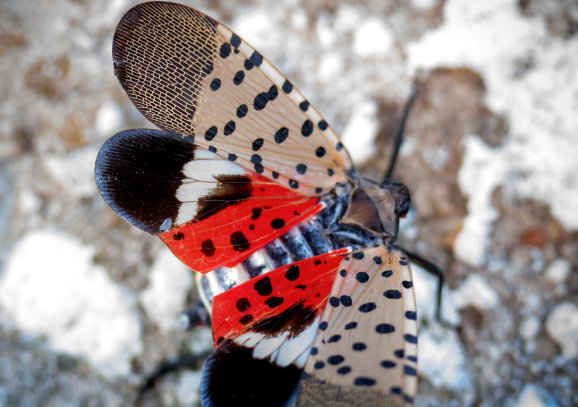The spotted lanternfly is yet another invasive species that has found its way into America from overseas. Originally from China and Viet Nam, the insect migrated into South Korea and Japan in 2006, and first appeared in Pennsylvania in 2014.
Now the pest has infested 19 eastern states, and was first detected in Kentucky and Tennessee in 2023.
In recent years, people noticed that their dogs were sniffing and seeking out lanternflies and their eggs as a snack. That led to state governments training dogs to hunt for the pest.
This month, the Tennessee Department of Agriculture has added two specially trained detection dogs in their Plant Certification Section to help protect Tennessee’s nursery and agricultural industries from the spotted lanternfly.
Winnie and Marcel graduated from the USDA's National Detector Dog Training Center in Georgia. Both detection dogs are actively working alongside plant inspectors Mary Glover and Kyle Webb. Glover and Winnie are stationed in Knoxville, while Webb and Marcel are operating out of Mt. Juliet near the state’s largest known area of lanternfly infestation.
Winnie and Marcel inspect areas where has been reported. Their precision has already led to successful detection in Sumner County.
The dogs will also be used to clear plant shipments from nursery-producing areas and make inspections at retail plant dealers.
Spotted lanternflies feed on a wide range of plants, including grapes, stone fruits, and hardwood trees. The hitchhiking pest lays its eggs on any hard surface including grills, vehicles, trailers, firewood, outdoor furniture, bikes, and toys. The insects can spread long distances when people and vehicles move infested material or items containing egg masses.
If you see lanternflies or an egg mass, take photos, then complete the form on Protect Tennessee Forests website at www.tn.gov/protecttnforests/resources/report-a-pest.html.
Next, stomp the insect and destroy egg masses by smashing or dousing with rubbing alcohol. Check vehicles, boats, or campers to make sure they aren’t carrying any insects or eggs.
Advertisement
Trained dogs search for spotted lanternflies in Tennessee
Advertisement
Latest State & National
State & National
yesterday
State & National
yesterday
State & National
Aug. 29, 2025
State & National
Aug. 29, 2025
State & National
Aug. 29, 2025
ADVERTISEMENT
Most Read >
ADVERTISEMENT
Latest State & National
State & National
yesterday
State & National
yesterday
State & National
Aug. 29, 2025
State & National
Aug. 29, 2025
State & National
Aug. 29, 2025
Advertisement
ADVERTISEMENT






